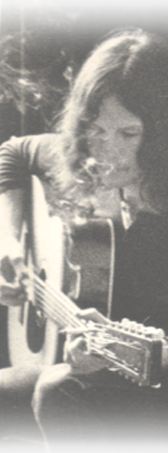Introduction |
Origins |
Management |
Recording Contracts |
Evolution |
LPs and CDs |
Bibliography |
Other References
Forever More: Introduction
1969 saw the birth of Forever More, described by “The Record Mirror” as “shades of... the Band and the Byrds”. (1) The four members in Forever More were: Alan Gorrie, on bass guitar, piano, and vocals; Mick Strode (aka Mick Travis), on electric and acoustic guitar and vocals; Onnie McIntyre (aka Onnie Mair) featured on guitar and harmony vocal work; whilst Stuart Francis appeared on drums and harmony vocals.
The principal songwriters for Forever More were Alan Gorrie and Mick Strode who wrote together and individually. Alan Gorrie, Onnie McIntyre, and Stuart Francis were all born in Scotland, but Mick Strode was born in Oldbury, which is in the West Midlands, England. For three years this band toured throughout the United Kingdom as well as Europe. In London, where the band was based, they recorded two LPs for RCA New York: “Yours” and “Words on Black Plastic”.
Forever More: Origins
Three of the Scottish musicians in Forever More – Alan Gorrie, Onnie McIntyre and Stuart Francis – had previously been in a line–up called Hopscotch (2, 3). Alongside them were two other Scottish musicians: pianist / vocalist Graham Maitland and vocalist Hamish Stuart, who later joined another London–based band, Crocodile. Hamish Stuart was eventually part of Sir Paul McCartney’s Wings.
Before helping to form Forever More, Mick Strode, meanwhile, had been the lead guitarist in various bands in the Midlands and Birmingham area, as well as in London, including the four–piece Band of Joy with whom he toured Scotland in 1968, alongside singer Robert Plant, drummer John Bonham, as well as bass player John Hill (4, 5, 6). Following that period, Mick Strode moved to London where he played in other line–ups, one of which was the New Yardbirds (7) with Ian Hunter (later of Mott The Hoople), who has described that period as “one of the strangest” (8) in his career.
In Shepherd’s Bush, London, following a visit in 1969 to The Cabin, a well–known rehearsal facility and equipment–hire centre for musicians (9), Mick Strode met Alan, Onnie, and Stuart of Hopscotch (10). Not long afterwards the four of them decided to form Forever More.
During their time together as Forever More, all four musicians also played as session musicians in various recording studios in London, with Mick Strode, for example, playing in March, 1971 with one of his guitar idols, George Harrison, on Ringo Starr’s single “It Don’t Come Easy”. (11)
Forever More: Management
Forever More was a band initially managed by International Artists. This was a company based in Gerrard Street, Soho (12), which also operated as a booking agency for musicians. Through such agencies musicians were able to obtain work at music venues such as clubs, pubs, concert halls, and festivals throughout the UK or abroad. (13, 14, 15) As reported in the book by Dr. Sonja Strode (2011) about musicians and music spaces in London in the 1960s / 70s, two of the agents for International Artists, as well as Martyn Barr (of Jethro Tull), lived in the same premises as she in Chiswick, London (16). It was this which generated her first meeting with Hopscotch members (Gorrie, McIntyre, and Francis), before her meeting with Mick Strode and their subsequent wedding the day after Forever More had supported Pink Floyd in Doncaster.
Mafalda Hall later became the manager of Forever More, whilst also managing Blossom Toes, James Litherland’s Brotherhood, and Brian Auger (formerly with Julie Driscoll and Trinity). Both Mafalda Hall and Brian Auger were a “huge help and encouragement” to Forever More. (17) Following this period, Forever More were managed by John Sherry Enterprises and Miles Copeland, as described below.
Recording Contracts and Forever More
Forever More were signed to RCA New York and produced two LPs on that label. Both LPs were recorded at Olympic Studios in London, at the end of 1969 / early 1970. However, whilst Forever More’s first LP “Yours” was released in 1970 in the United Kingdom and in America, their second LP “Words on Black Plastic” was released at the end of 1970 in the USA, but was not released until early 1971 in the UK. Both albums were produced by Ray Singer and Simon Napier–Bell, who were then known as Rocking Horse Productions. (18, 19, 20) Vic Smith was the engineer on “Yours”, an album which entered the American Billboard Charts, and described as “vocally tight, with instrumental control” and “flawless production”, (21) with similar accolades given for “Words on Black Plastic” recognized as a “greater affirmation of the group’s superiorities” (22), and engineered by Andy Johns. (23)
In 1970, as a band pursued by groupies, Forever More appeared in Lindsay Shonteff’s film “Permissive”. (24)
A pirated CD containing both Forever More albums was released in 2007 on “Retro Disc International, SL, Spain”, claiming to be “digitally re–mastered, original recordings”. However, it was copied from the original vinyl LPs and was not an official RCA release. Nevertheless the CD used the American version of the cover from Forever More’s first LP “Yours” in its packaging and promotion.
Forever More: Evolution
Just a short while before disbanding in 1971, Forever More, by means of a simple name change, became known as Glencoe. (25) Their line–up remained the same, however: Mick Strode, on lead electric guitar, had already introduced his mandolin playing and acoustic guitar into their live performances; and all four members continued doing vocal harmonies, although Alan Gorrie remained the principal singer, with Mick Strode singing solo on some numbers, especially his own songs. Alan Gorrie played both bass and piano on Forever More’s albums, but for live gigs Onnie McIntyre would sometimes switch to playing bass. Under their new name Glencoe, these four musicians toured with Wishbone Ash in 1971, (26), with the hope of returning in 1972 to Germany, where they had already successfully toured under their previous name – Forever More. (27, 28)
Not long after Forever More’s change of name to Glencoe in 1971, however, Onnie McIntyre and Alan Gorrie decided to leave the band.
Determined to continue performing and using the name Glencoe, guitarist Mick Strode and drummer Stuart Francis set about recruiting two new members for their band. This would be the second incarnation, therefore, of Glencoe as a band, and under which name the four musicians toured early in 1972 (from January 27 to February 20) on a subsequent UK–wide tour with Wishbone Ash – a tour promoted by “Pytheon Productions” (29). For Mick Strode and Stuart Francis this was the second time they had toured with Wishbone Ash.
Joining Mick Strode and Stuart Francis, the first new member of that second Glencoe line–up was Graham Maitland, a pianist who had previously played with Stuart Francis, prior to Forever More’s formation. The second new member was a very young bass player called Norman Watt–Roy (30), whose audition to join Glencoe, at the end of the summer of 1971, is described in Dr. Sonja Strode’s book (2011).(31)
Full details of this new Glencoe line–up, together with photos, are given in an eight–page tour brochure published by “Pytheon Productions” for that “Wishbone Ash in tour with Glencoe” in January / February, 1972. (32)
“Pytheon Productions” was a management company comprised of “John Sherry Enterprises” and Miles Copeland (33, 34) who managed Glencoe and Wishbone Ash, (35) whilst Ian Copeland was working as a booking agent for John Sherry.(36) “Pytheon Productions” described this new line–up, containing Mick Strode and Stuart Francis (the only two musicians from the original Forever More band) thus:
“Musically, their material incorporates funky country (and) good old rock ‘n’ roll”. (37)
This Glencoe line–up in 1972, therefore, was made up of Mick Strode (aka Mick Travis) on guitar, mandolin, and vocals; Graham Maitland on piano, electric accordion and vocals; Stuart Francis on drums; and Norman Watt–Roy on bass. They continued touring together widely in the United Kingdom after their highly successful tour earlier that year with Wishbone Ash.
Guitarist / songwriter Mick Strode decided to leave the band in April, 1972. Currently he lives, composes, and records in France (38, 39), his last three CDs having all been written and recorded there.
After leaving Forever More–Glencoe in late summer 1971, Alan Gorrie and Onnie McIntyre teamed up with Scottish saxophonists Roger Ball and Malcolm Duncan (40, 41, 42, 43, 44), drummer Robbie McIntosh, and Hamish Stuart to form the Average White Band. Roger Ball and Malcolm Duncan (aka Molly Duncan) (45) had been together in James Litherland’s Brotherhood (later known as Mogul Thrash). (46) Along with trumpeter Mike Rosen, they were known as the Dundee Horns. Forever More frequently jammed with this brass section at the end of gigs whenever the bands appeared on the same bill.
Forever More: Vinyl LPs and CD
- Yours - Forever More (1970) vinyl LP (RCA, LSP 4272)
- Words on Black Plastic (1971) vinyl LP (RCA, LSP 4425)
- Forever More CD: Yours and Words On Black Plastic (2007) RDI 33017
Richard Balls (2001 edition) “Sex & Drugs & Rock ‘N’ Roll: The Life of Ian Dury”, ISBN 0–7119–8644–4
Jools Holland (2007) “Barefaced Lies & Boogie–Woogie Boasts – The Autobiography”, ISBN 978–0718–14915–4
Simon Napier–Bell (1998 edition) “You Don’t Have To Say You Love Me”, ISBN 0–09–186573–5
Dr. Sonja Strode (2011) “Doctor Sonja’s Bitches Brew: A ‘telling’ journey through music spaces”, ISBN 978–2–9540755–0–1
Forever More: References – books, newspaper, magazine, websites, blogs
1. D. Davies “We all have the same roots – Celtic music...” in “The Record Mirror”, Feb. 27, 1971
2. “Valentine” magazine, 1970
3. Dr. Sonja Strode (2011) op. cit. ISBN 978–2–9540755–0–1, p. 231
4. “The Last Band of Joy” www.brumbeat.net/lettersI.htm
5. “The Band of Joy”: Wikipedia: https://en.wikipedia.org/wiki/Band of Joy
6. www.birminghamarchive.com/the–band–of–joy
7. justabuzz.com/ih–O–bio–shtm: biography about Ian Hunter
8. justabuzz.com – Ian Hunter biography
9. Dr. Sonja Strode (2011) op. cit. p. 312
10.“Valentine”, magazine, 1970
11. Dr. Sonja Strode (2011) op. cit. p. 245
12. Dr. Sonja Strode (2011) op. cit. pp. 236–238; p. 244, p. 248, and p. 250
13. R.T. “Glencoe – funky based rock with Scottish qualities” in “Sounds”, July 10, 1971
14. D. Davies (1971), op. cit.
15. Dr. Sonja Strode (2011) op. cit. p. 234, p. 244
16. Dr. Sonja (Strode (2011) op. cit. p. 244, p. 238, p. 306
17. D. Davies (1971), op. cit.
18. Simon Napier–Bell (1998 ed.) op. cit. ISBN 0–09–186573–5 pp.99–102 – photo and text no. 14 (in series of 16); p.173
19. Tom Cox “Last of the lost classics” in “Observer Music Monthly”, Jan. 20, 2008, Guardian News and Media Limited; and in “Forever More – Yours Forever More (RCA, 1970)”, Thursday, 11 May, 2007 in tomcoxblogspot.com/2007/05/forever–more–rca.html
20. Dr. Sonja Strode (2011) op. cit., p. 237
21. Mark Leviton “Forever more, or Less” in “The Daily Bruin”, University of California, Los Angeles, April 8, 1971, https:archive.org/stream/ucladailybruin56#pi – on microfilm Reel 56, p. 90
22. Mark Leviton, ibid
23. Dr. Sonja Strode (2011) op. cit. p. 236
24. Tom Cox, 2007, op. cit.
25.“Sounds”, July 10, 1971, op. cit.
26.“Sounds” ibid
27.“Sounds” ibid
28. Dr. Sonja Strode (2011), “The Star Club in Hamburg, 1969” in Dr. Sonja Strode (2011) op. cit. pp. 232–236
29.“Pytheon Productions”, 1972, based at 27 Dryden Chambers, 119 Oxford Street, London, W1 (details provided in tour brochure entitled “Wishbone Ash in concert with Glencoe”, Jan / Feb., 1972
30. Richard Balls (2001 edition) op. cit. ISBN 0–7119–8644–4 p.154
31. Dr. Sonja Strode (2011), “Auditioning with a gender difference” in Dr. Strode op. cit. pp. 253–256
32.1972 tour brochure published by “Pytheon Productions” for: “Wishbone Ash in concert with Glencoe”, Jan. 27 to Feb. 20
33. Giltrap.co.uk “News Update”, April 2014
34. Dr. Sonja Strode (2011), op. cit. p. 175, p. 251
35. Jools Holland (2007), op. cit. ISBN 978–0–718–14915–4, p. 6
36. Wikipedia (January 2016) entry for Ian Copeland states that his career in the music industry had begun via help from his brother, Miles: “first as a tour manager of Wishbone Ash”. Ian Copeland had then, according to this entry in Wikipedia, become “a booking agent in London at John Sherry Enterprises”. It further adds that Ian Copeland had “discovered the Average White Band and others” whilst working there.
37.1972 tour brochure published by “Pytheon Productions” for: “Wishbone Ash in Concert with Glencoe”, Jan.27 to Feb.20
38. Peter Viney “Forever More” for toppermost.co.uk/forever, March 27, 2014
39. Mick Strode’s official website
40. Peter Viney, March 27, 2014, op. cit.
41. Ed McKeon “Yours forevermore” for Caterwauled.blogspot.com, Monday, January 21, 2008, and used to accompany a radio show by Ed McKeon, Hartford CT, USA
42. Andy Powell of Wishbone Ash in interview, Sept. 2000:http://dmme.net/interviews/ash.html in which he referred to the first Glencoe line–up including all original members of Forever More
43. Dr. Sonja Strode (2011) op. cit. pp. 282–290
44. Simon Napier–Bell (1998 ed.) op. cit. p.177
45. Wikipedia (January 2016) entry for Average White Band
46. Wikipedia (January 2016) entry for James Litherland
Website addresses
archive.org/details/ucladailybruin56losa
www.birminghammusicarchive.com/the-band-of-joy
www.brumbeat.net/letters1.htm
caterwauled.blogspot.co.uk/2008/01/yours-forevermore.html
www.dmme.net/interviews/ash
www.doctorsonja.com
https://en.wikipedia.org/wiki/Band_of_Joy
www.facebook.com/drsonjastrode
www.justabuzz.com/ih-O-bio-shtml
www.theguardian.com/music/2008/jan/20/popandrock.features3
www.toppermost.co.uk






